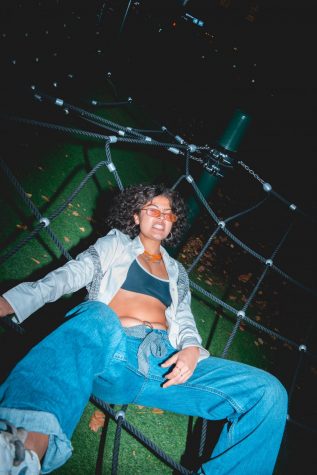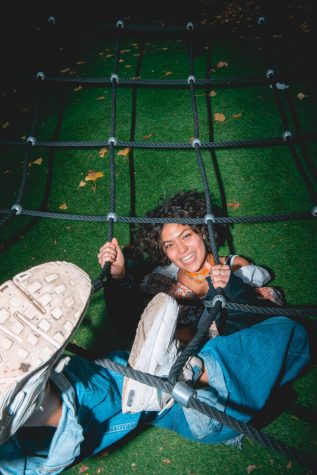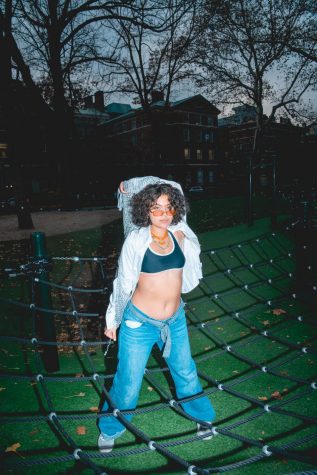Victoria Husain on leaning into pleasure: sex, nature and community
Victoria Husain teaches us what it means to be accepting of happiness and sexual energy.
December 10, 2021
“I hope we’re not in someone’s backyard.”
Victoria Husain and I are standing on a stone path in a community garden one block east of Tompkins Square Park. We had been walking around the city for about an hour and stumbled upon the garden by complete chance. It immediately drew Husain’s attention. We slipped in through the half-open gate and brushed past some bare trees into an open, grassy space. She runs her fingers along a branch by her face.
“You look like you’re looking at me,” she said to the tree limb. “Thank you.”
A light smile spreads across Husain’s face as they take in the garden’s beauty. They have a unique ability to find pleasure in everyday experiences, which is evident as I watch their eyes widen with excitement. It’s a type of appreciation that, according to Husain, a lot of people struggle to find because we aren’t taught how to look for it.
“Even if people say, ‘When you grow up, I want you to be happy,’ they don’t give you the skills to actually become fucking happy,” the Gallatin junior explained. “Because they literally can’t figure it out for themselves.”

But that’s what Husain is doing: figuring it out. She considers herself a “sex scholar” and an expert on finding connections between sex and nature all around her. Sex is usually what comes to mind when discussing pleasure, but to Husain, pleasure goes beyond the bedroom. She believes it is present in all aspects of life.
“The things that I feel and do … that is sexual energy,” said Husain. “It’s that manifestation of creation.”
As we walked through the community garden, La Plaza Cultural, we found a small bed of roses still blooming despite the cold November air. She drew me over, took one flower gently in her hand and brushed open its petals for me to see.
“You can look at how plants are [a] manifestation of sexual energy,” she explained to me. “Flowers, the way I look at them, are composed of layers and [they have] the same anatomy to what a vagina looks like.”
Husain considers themself to be very spiritual, which has shaped their unique perception of sex. They told me about divine feminine energy — it’s “related to a flower” — and that they used the freeing power of that belief to overcome the societal stigma they grew up with around sex.
Husain first looked up the word “sex” on Google when she was in third grade. She had picked up on palpable sexual tension in G-rated Disney movies, but nobody was explaining what she sensed. Her parents didn’t have much to say, and her traditional Pennsylvania public school sexual education class wasn’t helpful either. This lack of transparency, combined with her curiosity about a “natural human process,” quickly developed into a toxic relationship with sex and sexuality in high school.
“I would just lower my boundaries,” she said. “I would just be like, ‘fuck it.’ You’re giving me validation in the way that society tells women ‘that’s how you’re valuable’ — sexy.”
Husain felt the same kind of sexualization directed towards her racial identity, too. As a Colombian-Indian woman and one of only a few people of color in her school, people, especially men, treated her like she was an exotic animal when they discovered her ethnicity. At times she found herself using it to her advantage, playing the exotic card as a way to capture sexual attention. There’s a fine line between being appreciative of sex and seeing yourself as a sexual object, one that many women aren’t taught to see.

Looking back, Husain realizes how much she’s overcome to view sex in a positive light. It was by reading Adrienne Maree Brown’s “Pleasure Activism” that she developed a new perspective on sexual pleasure and happiness. For Husain, the key to pleasure is doing what she loves with the people that she loves.
And so she started Good Fxcking Music.
“In April 2020, we were all bored as fuck,” reads Husain’s website. During quarantine, she missed the sense of community she had been creating at NYU. But rather than sit idly by, Husain took matters into her own hands. She reached out to Arty Furtado, a producer she had known prior, and organized a virtual concert in a matter of hours. Together, they gathered over 35 artists to come to a Zoom session and share their music with others. She said the first concert was electric — there was an “intense, energetic solidarity” among the performers. After that, virtual concerts became regular sessions.
“We’d get anywhere from 30 to 200 people on a call at once to share music with one another, just kind of collaborating, networking and sharing music,” said Will Florentino, a CAS junior who has performed at the Good Fxcking Music virtual concerts. “It was a really wholesome and gratifying and validating experience to meet all of these people in a virtual setting over the pandemic.”
Florentino is a rapper and producer whose music is a way for him to reach out to different groups of people. He first came across Good Fxcking Music on social media, which is how his friendship with Husain began.
“[Husain] is just one of those people who’s very passionate about following her beliefs,” Florentino said. “She’s able to create actionable things for people to get involved in [within] their community. And I think that’s a pretty valuable characteristic of her person — providing the avenues for people to engage in the community. ”
That sense of community persisted in Husain’s other endeavors. They described their Gallatin concentration as “ways to organize people towards freedom.” Husain takes classes such as marketing and applies what they learn towards building communities. They also study some aspects of sociology, namely capitalism and how money can make or break communities.

“After you’ve been running organizations too, that’s a whole thing — you’ve got to learn how to have people come together and do things together,” Husain said.
Lorraie Forbes, a member of the activism organization Teens Take Charge, hosted a Zoom event with Husain and another member of the organization in Rubin Hall last year. The event was a partnership between the organization and NYU designed to be a discussion about activism. There was not a single dull moment in the conversation, Forbes recalled — Husain stepped up and kept the discussion lively and impactful.
“Tori and others made the space so safe and so non-judgmental, so we could really say whatever was on our minds without feeling like we needed to censor anything,” Forbes said. “I will never forget how safe I felt in that space.”
Forbes kept in touch with Husain after the event’s incredible success, and even joined @openthefuckup — an organization Husain co-created with fellow NYU junior Zoya Hasan in 2020. The page serves as a platform for people to ask uncomfortable questions that aren’t talked about.
“One thing about Tori: Everything she does is a statement,” Forbes said. “She’s a great person, and I’m so glad I had the opportunity to meet her. She reaches out every now and then and she makes sure to uplift me.”
Husain’s knack for bringing people together is what makes her admirable. She and I found a new community together that November day. The garden brings Husain’s ideas about pleasure together. Sex, nature and community, all intertwined — that’s what she believes pleasure should be about.
“I don’t think we have an actual understanding of pleasure, because people [deny themselves of] it just so they can pay their bills,” Husain said. “I think we talk about the priorities of life in the wrong way.”
Contact Jules Roscoe at [email protected].

